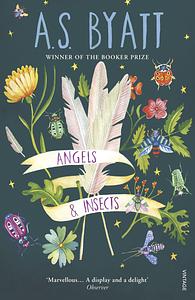Take a photo of a barcode or cover
challenging
mysterious
slow-paced
Plot or Character Driven:
A mix
Strong character development:
No
Loveable characters:
Complicated
Diverse cast of characters:
No
Flaws of characters a main focus:
Yes
First of all, a little summary, because my paperback copy had little in the way of a blurb:
The first story, Morpho Eugenia, opens with an entomologist, William Adamson staying at the grand house of an acquaintance, Mr Alabaster after being shipwrecked on his return from the Amazon, where he had been researching for years. While there, he falls in love with the eldest daughter of Alabaster, but becomes more consumed with researching a colony of ants.
The second story, The Conjugial Angel, opens with a seànce. The main idea The Conjugial Angel seems to be an exploration of the relationship between Alfred, Lord Tennyson, and Arthur Hallam (the subject of Tennyson’s In Memoriam A. H. H.) decades after the death of Hallam, as well as the feelings of people around them.
I’m giving this collection overall 2,5 stars, because Morpho Eugenia was more of a 2 star for me, and The Conjugial Angel a 3 star. I struggled to get through Morpho Eugenia, largely because I couldn’t really see what Byatt was trying to do with the story. There were discussions of the contrast between the Amazon and England from the perspective of a researcher, there were discussions of the intersection and opposition between Darwinism and Christianity in the 1860s, there was an analogy related to ants, and a few other questions or ideas that were covered in some detail, but never enough for me to feel like this story was actually about something other than the overall romantic, which I personally didn’t find very interesting, especially as in the novella format there isn’t much space to grow attached to a character and root for a romantic plot. I did enjoy the character of Matty Crompton, and her short story within the novel, but the excerpts from all the other pieces of writing as well as the other characters just weren’t very interesting to me. I feel like there was an attempt here to cover more ground than the story had space for, and instead of being provocative, it was just a little empty.
I enjoyed The Conjugial Angel a lot more, though. This story is more introspective than Morpho Eugenia (even though Morpho Eugenia is already quite introspective). The story begins with a seànce (which I agree with other reviewers dragged on a bit), after which there are sections of almost stream of consciousness writing giving an insight into the feelings of a few of the characters. I think A. S. Byatt’s prose shines much more in this story than in Morpho Eugenia, and there were some passages and sentences that I thought were beautiful. The feelings of the characters had depth to them, and the ideas explored in this story were given the time they needed. I do think that a lot of my enjoyment of this story came from a pre-existing interest in Tennyson, and having some background knowledge on In Memoriam and its context, because that is most of what the middle section is about. There are as many excerpts of poetry in The Conjugial Angel as there are excerpts of the writings of characters in Morpho Eugenia, so, you know, be warned. I would say to pick up this story if you enjoy a very character-focused novel, and if you’re interested in Victorian poetry, or in Tennyson particularly, but if neither of those are your thing, The Conjugial Angel might be a bit of a slog. There was also a decent amount of discussion of Swedenborgian (?) theory, a kind of Victorian Christian spiritualism, which I don’t find that interesting, but it was easy enough to get through.
Graphic: Grief
Moderate: Incest, Pregnancy
Minor: Miscarriage
The 2nd story could not hold my attention, although I enjoyed the first.
More like 3.5 stars. I enjoyed Morpho Eugenia a lot but found The Conjugial Angel a bit too cerebral, too weirdly religous.
Morpho Eugenia is stunning. Byatt's trademark blend of meticulous, intricate historical detail woven in with unsettlingly intense, fleshy passion.
The Conjugial Angel feels a little more diluted, but still has the occasional very striking image - for me this is the way Sophy sees the "true" selves of the others in the seance when they are sitting round the table. The ending came as a little bit of a surprise to me, though - I was wondering if we would possibly get a more concrete followup to thehint of lesbian desire between Mrs Papagay and Sophy, which would've been an interesting parallel to Byatt's tentative musings on Tennyson's feelings for Hallam...
I don't agree with people saying the two novellas are only tenuously connected; they complement each other in some fairly obvious ways imo.
The Conjugial Angel feels a little more diluted, but still has the occasional very striking image - for me this is the way Sophy sees the "true" selves of the others in the seance when they are sitting round the table. The ending came as a little bit of a surprise to me, though - I was wondering if we would possibly get a more concrete followup to the
I don't agree with people saying the two novellas are only tenuously connected; they complement each other in some fairly obvious ways imo.
challenging
dark
emotional
mysterious
reflective
slow-paced
Plot or Character Driven:
Character
Strong character development:
Yes
Loveable characters:
Complicated
Diverse cast of characters:
No
Flaws of characters a main focus:
Yes
funny
inspiring
slow-paced
To be honest, I only read the first novella, the one that the film version of Angels & Insects is based on. I read it in a day, and I loved it just as much as I love the movie. The second novella? I must have tried to start that one at least 3 times, and I just couldn't do it.
Morpho Eugenia is infinitely better than the second novella in this compilation. William Adamson,explorer and etymologist, comes into the household of Lord Alabaster. What follows is a neo-19th-century melange of intrigue, love, romance and shocking revelations. The ending felt rushed and left me unsatisfied. Still, the metaphor of red and black ants, invading and enslaving each other, is masterfully composed. 3/5




